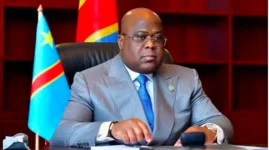SADC Pledges Action After M23 Rebels Break Congo Peace Deal, Kill Peacekeepers.
The M23 rebel movement has shattered the peace in the Democratic Republic of Congo (DRC), attacking peacekeepers and seizing the major city of Goma. The attacks killed 13 peacekeepers from South Africa, Malawi, and Uruguay.
SADC Chairman President Mnangagwa issued a stern response Monday night. "SADC will assume its full responsibility and take action to deal with the deteriorating security and humanitarian situation in Eastern DRC," he said. He emphasized that those behind the violence must face consequences.
The fighting has created a massive humanitarian crisis. Over 400,000 people fled their homes early this month, with numbers rising as violence continues around Goma. Hundreds have died in the attacks.
Peacekeeping forces from both SADC and the UN mission Monusco have maintained a presence in eastern DRC for more than a year. Former SADC chair President João Manuel Goncalves Lourenco of Angola led peace negotiations with support from the African Union. His diplomatic efforts resulted in agreements between the DRC government and M23.
M23's recent military actions have completely violated these agreements. Their ability to capture Goma, a city of over one million people, suggests an external supply of weapons and ammunition rather than limited existing resources.
The situation reflects SADC's commitment to supporting legitimate governments. DRC's democratic progress stands clear - President Felix Tshisekedi came to power through an opposition victory in 2018, marking the country's first peaceful transfer of power. He won re-election in 2023.
The SADC Secretariat demands all parties honor peace agreements and calls for M23 to withdraw from occupied territories. Previous rebel movements across Africa have successfully transitioned into legitimate political parties, an option M23 rejected by choosing violence.
Regional complications persist, including refugee movements from earlier conflicts in the Great Lakes region. However, the DRC government under both Presidents Kabila and Tshisekedi has shown commitment to effective administration and border security.
SADC's response may include expanded diplomatic efforts to isolate rebel support alongside direct action against active rebels - a strategy that proved effective in Mozambique. The African Union backs these SADC-led initiatives, recognizing that armed rebellion cannot serve political aims.
The M23 rebel movement has shattered the peace in the Democratic Republic of Congo (DRC), attacking peacekeepers and seizing the major city of Goma. The attacks killed 13 peacekeepers from South Africa, Malawi, and Uruguay.
SADC Chairman President Mnangagwa issued a stern response Monday night. "SADC will assume its full responsibility and take action to deal with the deteriorating security and humanitarian situation in Eastern DRC," he said. He emphasized that those behind the violence must face consequences.
The fighting has created a massive humanitarian crisis. Over 400,000 people fled their homes early this month, with numbers rising as violence continues around Goma. Hundreds have died in the attacks.
Peacekeeping forces from both SADC and the UN mission Monusco have maintained a presence in eastern DRC for more than a year. Former SADC chair President João Manuel Goncalves Lourenco of Angola led peace negotiations with support from the African Union. His diplomatic efforts resulted in agreements between the DRC government and M23.
M23's recent military actions have completely violated these agreements. Their ability to capture Goma, a city of over one million people, suggests an external supply of weapons and ammunition rather than limited existing resources.
The situation reflects SADC's commitment to supporting legitimate governments. DRC's democratic progress stands clear - President Felix Tshisekedi came to power through an opposition victory in 2018, marking the country's first peaceful transfer of power. He won re-election in 2023.
The SADC Secretariat demands all parties honor peace agreements and calls for M23 to withdraw from occupied territories. Previous rebel movements across Africa have successfully transitioned into legitimate political parties, an option M23 rejected by choosing violence.
Regional complications persist, including refugee movements from earlier conflicts in the Great Lakes region. However, the DRC government under both Presidents Kabila and Tshisekedi has shown commitment to effective administration and border security.
SADC's response may include expanded diplomatic efforts to isolate rebel support alongside direct action against active rebels - a strategy that proved effective in Mozambique. The African Union backs these SADC-led initiatives, recognizing that armed rebellion cannot serve political aims.












